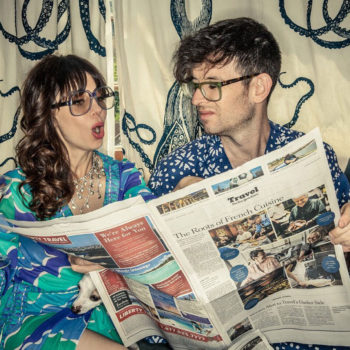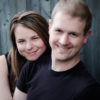Natasha Leggero is one of the creators and stars of the Comedy Central show “Another Period.” Moshe Kasher, is a producer on that show and a stand-up comedy star. You may’ve seen him on “Brooklyn Nine-Nine” and “Maron.” The two just got married, and are currently road-tripping around the country doing a series of live shows they’ve dubbed “The Honeymoon Tour.” With that in mind, we invited them to craft a guest list, in which interesting people list interesting things. Check out their premise below, or hear their delightful banter above.

Moshe Kasher: You ready hun?
Natasha Leggero: Yeah hun.
Moshe Kasher: I’m Moshe Kasher, comedian, author, actor, lover.
Natasha Leggero: And I’m Natasha Leggero, actress, singer, dancer, visual artist.
Moshe Kasher: My wife.
Natasha Leggero: His wife.
Moshe Kasher: And, we’re gonna make a romantic road trip of our own. Lot of love making, lot of comedy, lot of laughs, and a lot more love making. But we thought today we would introduce to you, some examples of the opposite. This is our list of the worst, most dystopian road trips in pop culture history.
“National Lampoon’s Vacation” (The Original One)
Natasha Leggero: So the first one we’re gonna do is “Vacation.” For all you millennials out there, “Vacation” is a hilarious movie from the ’80s about a family that goes on a big vacation together and everything goes wrong.
I loved this movie, but it did sort of reflect every time my family tried to take a road trip. That place you were trying to get to and it never quite worked out the way you wanted, and everyone would fight, and an aunt would die.
Moshe Kasher: [Laughing] An aunt would die every time you’d go on vacation? I always make fun of Natasha when she describes her childhood. I’m always like, “That’s right you had two evil step sisters, is that right? And you went to a ball and you left a slipper there. Am I getting this narrative correct?”
But, right, “Vacation” is a story about a family that has a Utopian ideal about what it means to be a family, all contained in the metaphor of what was it called, like Barney Land or whatever?
Natasha Leggero: Wally World.
Moshe Kasher: Wally World, right [laughs].
Natasha Leggero: [Laughs.] Barney Land.
Moshe Kasher: And then they get to Wally World and it’s just closed.
Natasha Leggero: To me that’s really such a great climax to the movie. And I also like when he tries to cheat on his wife with Christie Brinkley.
Moshe Kasher: That’s a metaphor for actually Natasha and my relationship. It’s true because I recently had an affair with Barbara Walters. Moving on… No Christie Brinkley is a model, right? That joke didn’t work the way I wanted it to.
Natasha Leggero: Yeah. Barbara Walters?
Moshe Kasher: I thought for some reason Christie Brinkley was a news person but then I realized-
Natasha Leggero: You’re thinking of David Brinkley, I think.
Moshe Kasher: [Laughs.] You may be right. Yeah, that’s right. I would like to, if I could, re-frame my joke. I recently had an affair with Ted Koppel [Natasha laughs].
The Magnetic Fields – “The Charm of the Open Highway Strip”
Moshe Kasher: OK, number two.
Natasha Leggero: Number two!
Moshe Kasher: Number two! Moving into a new genre of media. Music.
The Magnetic Fields is an amazing band that both of us love and actually plays an integral role in the beginnings of our relationship. Isn’t that right, Natasha?
Natasha Leggero: Well I just, I got really into them, but I could never meet anyone who ever heard of them. And then I met Moshe.
Moshe Kasher: Oh, I was the first person you dated that had heard of The Magnetic Fields?
Natasha Leggero: Well they just weren’t… I just could always tell if someone was cool if they knew who they were. Just like how like if someone likes Lenny Kravitz, you’re like, “Oh OK. I can’t be friends with you.” It’s like the opposite of that.
Moshe Kasher: Yeah I would say Stephin Merritt of The Magnetic Fields is one of the great songwriters of our generation.
Natasha Leggero: And also funny.
Moshe Kasher: Very funny, tongue in cheek. And they do an album called, “The Charm of the Open Highway Strip,” which is the concept album exclusively about road trips, but it’s incredibly un-positive. It’s incredibly dour.
There are song titles such as “Lonely Highway,” there’s a song called, “When the Open Road is Closing in.” One of the great lyrics in the song called “Two Characters in Search of a Country Song” — already an amazing sounding title — says, “You were just like me / You were one big bruise. In the game of life / We were playing to lose.” Doesn’t get more negative than that. How can I get more negative than that? Cormac McCarthy’s “The Road.”
“The Last of Us”
Moshe Kasher: I only mention Cormac McCarthy’s The Road because A- I’m an American man and you’re required to mention Cormac McCarthy whenever people ask you for a list of things, and also because I figure that “The Dinner Party Download” fans would prefer a book to what I’m about to actually recommend, which is the video game “The Last of Us.”
Natasha Leggero: Oh my God.
Moshe Kasher: Natasha, please. Cormac McCarthy’s “The Road” is a dystopian look at a post-apocalyptic landscape where a father is walking his son, to an unknown utopia that probably doesn’t exist. And “The Last of Us” basically has just pilfered the plot of Cormac McCarthy’s “The Road” and made an unbelievably playable, sad, engrossing video game. I mean the question of video games is always if they can make a video game with a plot as intricate as a movie, and I think “The Last of Us” got as close as a video game has ever gotten. It’s almost like art.
Natasha Leggero: Moshe, I have a question about this video game.
Moshe Kasher: Yes Natasha?
Natasha Leggero: Is this the video game you’ve been playing recently?
Moshe Kasher: No that’s “Fallout 4,” which is also a dystopian journey across a hellscape.
Natasha Leggero: Now “The Last of Us,” is there a lot of guns? Is there like arms that turn into machine guns? What exactly is the landscape?
Moshe Kasher: You know Natasha, it’s like you think that I can’t hear straight through the derision in your voice and I can.
Natasha Leggero: We are in different cities right now. I’m in New York, Moshe’s in L.A., so we don’t have each other to play off of.
Moshe Kasher: And yet I can still feel the vibratory frequency of your judgment.


